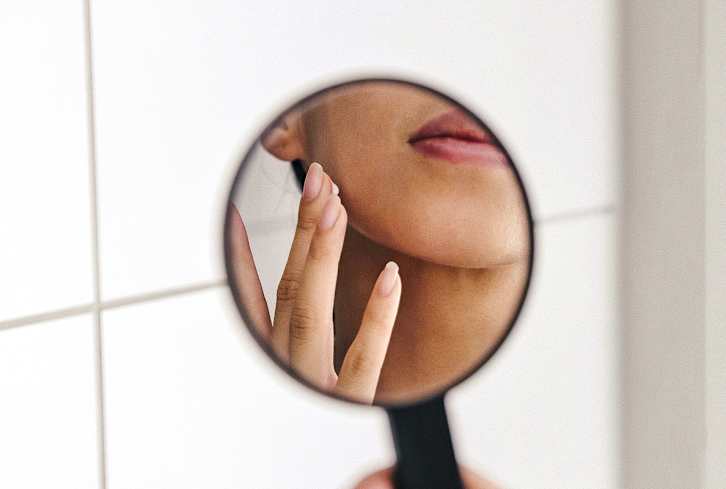Advertisement
Struggling With Low Sex Drive? These 12 Things Could Be To Blame


Most people don't openly address low libido with their doctors until they're asked personal questions and the naked truth is revealed. There are millions of women who dread having sex with their partner and would rather sleep, men who go months or years without having a healthy intimate relationship with their spouse.
It amazes me how many people settle for health problems like a low libido because they think it's normal or a side effect of aging. Just because something is common doesn't make it normal. My job as a functional medicine practitioner is to get to the root cause of health problems like a low sex drive. So instead of just taking another pill, why don't we actually find out why you have the problem in the first place?
Here are some of the common reasons for a low sex drive that I see in my medical practice:
1. Low iron
Iron is needed to get oxygen to your cells, and if your levels are low, I find that one of the symptoms can be low sex drive. In fact, a study published in PLoS One found sexual function and satisfaction were significantly lower in women with iron deficiency anemia (IDA.)1 I suggest having your iron and ferritin levels tested to see where you add up.
What to do: If your levels are low, you have to find out the cause. I suggest first working with your doctor to rule out any internal bleeds. Once that is cleared, eating iron-rich foods like grass-fed liver or beef as well as green leafy vegetables and beets is a great way to start restoring your iron stores.
2. Adrenal fatigue
Adrenal fatigue occurs when the adrenal glands are not properly producing the stress hormone cortisol. It causes cortisol levels to be either too high or too low, and this can leave you feeling exhausted and burnt out. Higher cortisol levels can interfere with sexual arousal2, research shows, and experiencing chronic stress can have the same effect. 3
What to do: Having struggled with adrenal fatigue myself in the past, I know firsthand the most effective tools. A comprehensive approach that includes stress and sleep management, adaptogenic herbs, and healing foods are some of my top tools for adrenal fatigue. I also recommend working with your doctor to find a personalized plan.
3. Underactive thyroid
Underactive thyroids4 don't produce enough hormones, which can lead to lethargy, exhaustion, and fatigue. Studies have also shown hypothyroidism can impair female sexual function5, including desire, arousal, lubrication, orgasm, satisfaction, and pain.
What to do: I suggest getting comprehensive thyroid testing because there are many underlying thyroid problems that don't show up on basic thyroid labs. Depending on your results, work with your doctor or endocrinologist to find a personalized strategy to support optimal thyroid health.
4. Gut problems
Your gastrointestinal system is known as the "second brain" because of the gut-brain axis. This connection leads to mood disorders, like stress, anxiety, and depression. Studies have linked mental health disorders to sexual dysfunction. 6
What to do: Begin supporting your gut by taking quality probiotics, eating a healthy, gut-friendly diet, and exercising frequently, to name a few.
5. Sex hormone imbalance
Hormones, like anything else in the body, are subject to the "Goldilocks principle:" not too high, not too low, but just right. When your estrogen, progesterone, or testosterone levels are unbalanced it can leave you feeling completely uninterested in sex.7
What to do: Start by having a comprehensive hormone panel done, then working with a doctor to find the best treatment plan, including what to eat to balance your hormones.
6. Insulin resistance
High insulin levels can lead to conditions like metabolic syndrome and polycystic ovary syndrome (PCOS), both of which can also result in low sex drive and fertility issues7.
What to do: Run fasting glucose and Hgb A1c levels to see if you are insulin resistant, then work with a doctor to find the best plan of action. Some doctors suggest intermittent fasting and keto diets may help lower insulin levels.
7. Medications
One issue that is often overlooked when it comes to a low libido is medication. Common medications like antidepressants, blood pressure medications, painkillers, and antihistamines can cause low sex drive and erectile dysfunction in some people8.
What to do: Talk with your doctor about potential alternatives to the medication you're taking. You could also consider a functional medicine approach, which focuses on becoming healthy overall, so your doctor can reduce and eliminate medications where possible.
8. Stress
Regardless of how healthy your diet and exercise regime may seem, if you're constantly stressed it could be interfering with your overall health, energy levels, and yes, your sex life.
What to do: Practice stress-reduction, like mindfulness, meditation, yoga, tai chi, and breathwork.
9. Leptin resistance
This lesser known hormonal problem occurs when your hypothalamic brain cells aren't communicating with leptin, a hormone released from fat cells. Leptin resistance has been shown to lower testosterone levels9, which decreases libido in both men and women.
What to do: If your leptin and CRP inflammation levels are high, try to limit refined sugars, refined grains, and other inflammatory foods. Instead focus on anti-inflammatory foods and get plenty of sleep.
10. Low growth hormone (GH)
What to do: Herbs like horny goat weed and Ginkgo biloba are commonly used to support healthy growth hormone levels. Working with your doctor to find other treatment options, like hormone replacement therapy or other medications may also be beneficial.
11. Vitamin D deficiency
Studies have shown vitamin D deficiencies can lead to depression and sexual dysfunction in healthy males12 and females. 13
What to do: Get your vitamin D levels tested, supplement according to your doctor's recommendations, and try to spend more time in nature.
12. Insufficient healthy fats
Healthy fats like coconut oil, avocados, ghee, and olive oil are needed to make healthy hormones and brain function. One study found people who ate a low-fat diet had significantly lower testosterone levels14 than those who did not.
What to do: Eat plenty of healthy fats. This can include healthy oils and omega-3 fatty acids, like fish, seeds, and nuts.

Will Cole, IFMCP, DNM, D.C., is a leading functional medicine expert who consults people around the globe, starting one of the first functional medicine telehealth centers in the world. Named one of the top 50 functional and integrative doctors in the nation, Dr. Will Cole provides a functional medicine approach for thyroid issues, autoimmune conditions, hormonal imbalances, digestive disorders, and brain problems. He is the host of the popular The Art Of Being Well podcast and the New York Times bestselling author of Intuitive Fasting, Ketotarian,The Inflammation Spectrum, and Gut Feelings.
More from the author:
Functional Nutrition Training
Check out Functional Nutrition Coaching
A cutting-edge nutrition deep dive taught by 20+ top health & wellness experts
Learn moreMore from the author:
Functional Nutrition Training
Check out Functional Nutrition Coaching
A cutting-edge nutrition deep dive taught by 20+ top health & wellness experts
Learn more
Will Cole, IFMCP, DNM, D.C., is a leading functional medicine expert who consults people around the globe, starting one of the first functional medicine telehealth centers in the world. Named one of the top 50 functional and integrative doctors in the nation, Dr. Will Cole provides a functional medicine approach for thyroid issues, autoimmune conditions, hormonal imbalances, digestive disorders, and brain problems. He is the host of the popular The Art Of Being Well podcast and the New York Times bestselling author of Intuitive Fasting, Ketotarian,The Inflammation Spectrum, and Gut Feelings.
14 Sources
- https://www.ncbi.nlm.nih.gov/pmc/articles/PMC6283628/
- https://www.ncbi.nlm.nih.gov/pmc/articles/PMC2703719/
- https://www.ncbi.nlm.nih.gov/pmc/articles/PMC4199300/
- https://www.ncbi.nlm.nih.gov/books/NBK279601/
- https://www.ncbi.nlm.nih.gov/pmc/articles/PMC7261687/
- https://www.ncbi.nlm.nih.gov/pmc/articles/PMC3662135/
- https://www.ncbi.nlm.nih.gov/pmc/articles/PMC5776161/
- https://www.ncbi.nlm.nih.gov/pmc/articles/PMC2695750/
- https://pubmed.ncbi.nlm.nih.gov/9302400/
- https://pubmed.ncbi.nlm.nih.gov/10484056/
- https://pubmed.ncbi.nlm.nih.gov/23014134/
- https://pubmed.ncbi.nlm.nih.gov/29973697/
- https://pubmed.ncbi.nlm.nih.gov/27544743/
- https://pubmed.ncbi.nlm.nih.gov/6298507/











